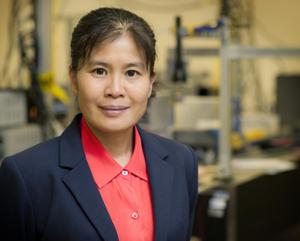Jan 31 2015
A University of Texas at Arlington engineering professor is developing a distributed wireless antenna sensor system to monitor conditions of coal-fired boilers that will lead to making the units safer, more efficient and eventually producing better designed units.
 Haiying Huang, professor of Mechanical and Aerospace Engineering, received a Department of Energy grant to develop a wireless sensor system that will lead to more efficient and safer boilers. (Credit: UT Arlington)
Haiying Huang, professor of Mechanical and Aerospace Engineering, received a Department of Energy grant to develop a wireless sensor system that will lead to more efficient and safer boilers. (Credit: UT Arlington)
Haiying Huang, professor of sensor technology in the Mechanical and Aerospace Department, said a $399,311 Department of Energy grant will fund the study of sensors to monitor the integrity as well as the heat transfer of the coal-fired boilers.
The distributed system employs wireless micrtostrip patch antennas as sensors and is much more accurate than traditional devices.
"The benefit of using these new sensors is that it allows for in-process control of the boilers," Huang said.
Huang is teaming with co-principal investigators Jian Luo, a professor in the Department of Nanoengineering at the University of California San Diego, and Ankur Jain, a UT Arlington assistant professor in the Mechanical and Aerospace Department.
"We'll not only measure temperature but strain distribution within the boiler and soot accumulation," Huang said. "It allows for real-time health assessment of structural components."
Khosrow Behbehani, dean of the College of Engineering, said that the success of the sensors could lay the foundation for producing a family of high-temperature sensors.
"The findings of this research on monitoring the structural integrity of the boilers wirelessly will have other important industrial applications," Behbehani said.
Ankur Jain, assistant professor in the UT Arlington Mechanical and Aerospace Department, said his role would be evaluating the antenna sensors in an environment imitating a boiler.
'These sensors will help us wirelessly monitor the state of the boiler and take proactive decisions related to boiler health," Jain said.